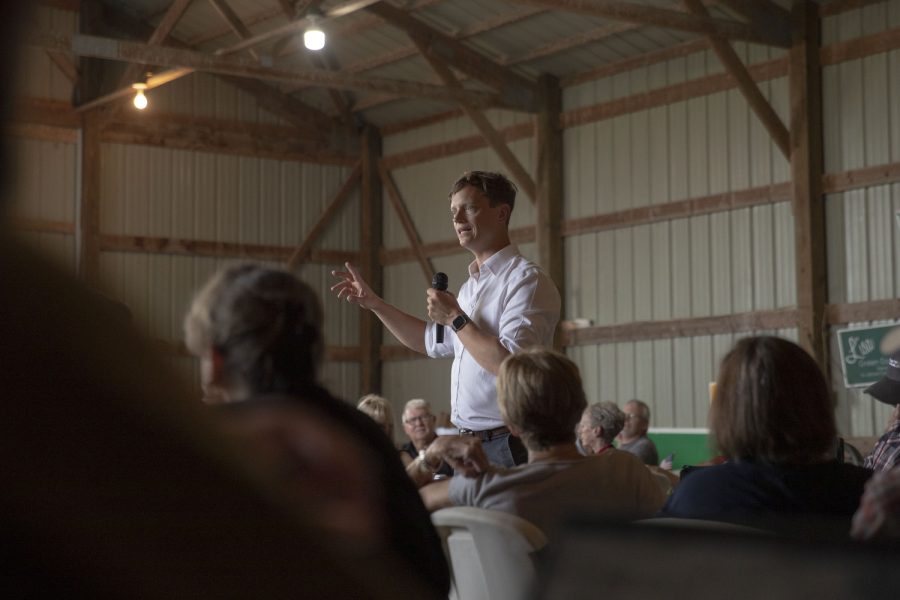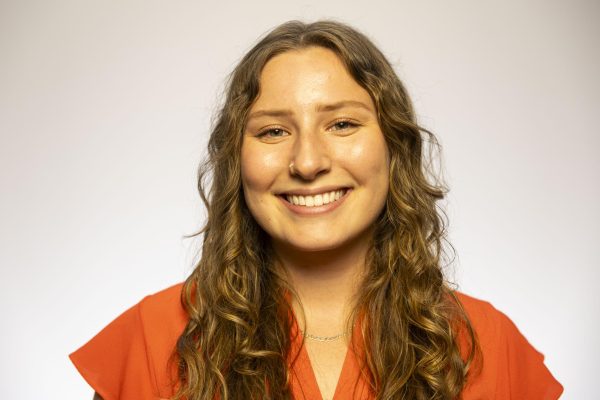Iowa taxpayers could be responsible for shortfalls of UI $1.2 billion utilities deal
State Auditor Rob Sand cautioned government officials on the future public/private partnership deals after $1.165 billion March 2020 University of Iowa utilities deal.
Iowa State Auditor Rob Sand speaks during the Kinney Summer BBQ Bash at the Kinney Family Farm in Oxford, Iowa on Saturday, Aug. 27, 2022.
December 14, 2022
Following an investigation of the University of Iowa public/private partnership, a deal finalized in March 2020, State Auditor Rob Sand recommended Gov. Kim Reynolds and the Iowa Legislature closely consider the cost-benefit of the agreement before entering another deal in the future.
In the report released by the Iowa Office of Auditor of State Wednesday, Sand wrote he had concerns about the public/private partnership agreement. He reported the uncertainty of the partnership’s success in lieu of low state funding is a risk for taxpayers.
“In the event the University’s investment of the proceeds does not meet the return on investment needed to pay the amounts due to the concessionaire, Iowa taxpayers may be responsible for making up any shortfall,” Sand wrote. “As a result, this transaction has become the largest financial obligation ever held by Iowa taxpayers.”
The state Board of Regents signed a 50-year agreement in December 2019 to lease and operate the UI’s utility system in a public/private partnership with ENGIE/Meridiam. The university received an initial upfront lump sum of $1.165 billion.
Former UI President Bruce Harreld, who served as president at the time, said at a regents meeting in December 2019 he hoped the partnership would bring in $3 billion over the 50-year period.
Sand’s report was conducted to determine if any “unbusinesslike practices” occurred in the agreement. This was in compliance with sections of the Code of Iowa, the report said.
He said it seems inappropriate for a government department to take on one of the largest financial obligations held by Iowa taxpayers.
“Such practices lead to a lack of accountability and transparency,” Sand wrote.
The partnership’s funds are used to cover the cost of the UI’s utility debt, consulting fees related to the P3 agreement, and other costs. The remaining funds will be put into the UI Strategic Initiative Fund, a nonprofit managed by the UI.
Operating funds for the regent universities come primarily from state operating appropriations and tuition revenues. State appropriations for regents institutions decreased 30.5 percent of total revenues in fiscal 2023, the audit stated.
“Because of the continued decrease in State Appropriations used to support general operations at the three State Universities, the BOR and Universities have used increases in tuition and fees to support general operations,” Sand wrote.
Before the public/private partnership was passed, Iowa Democratic lawmakers were concerned about the partnership because its success was dependent on uncertain factors. The lawmakers advocated for oversight of the long-term agreement.
The Auditor’s Office interviewed university and regent officials, reviewed applicable sections of the Code of Iowa, and the regents and university policy and procedures, during the investigation. Sand wrote that no conflicts of interest with ENGIE/Meridiam were identified.
















